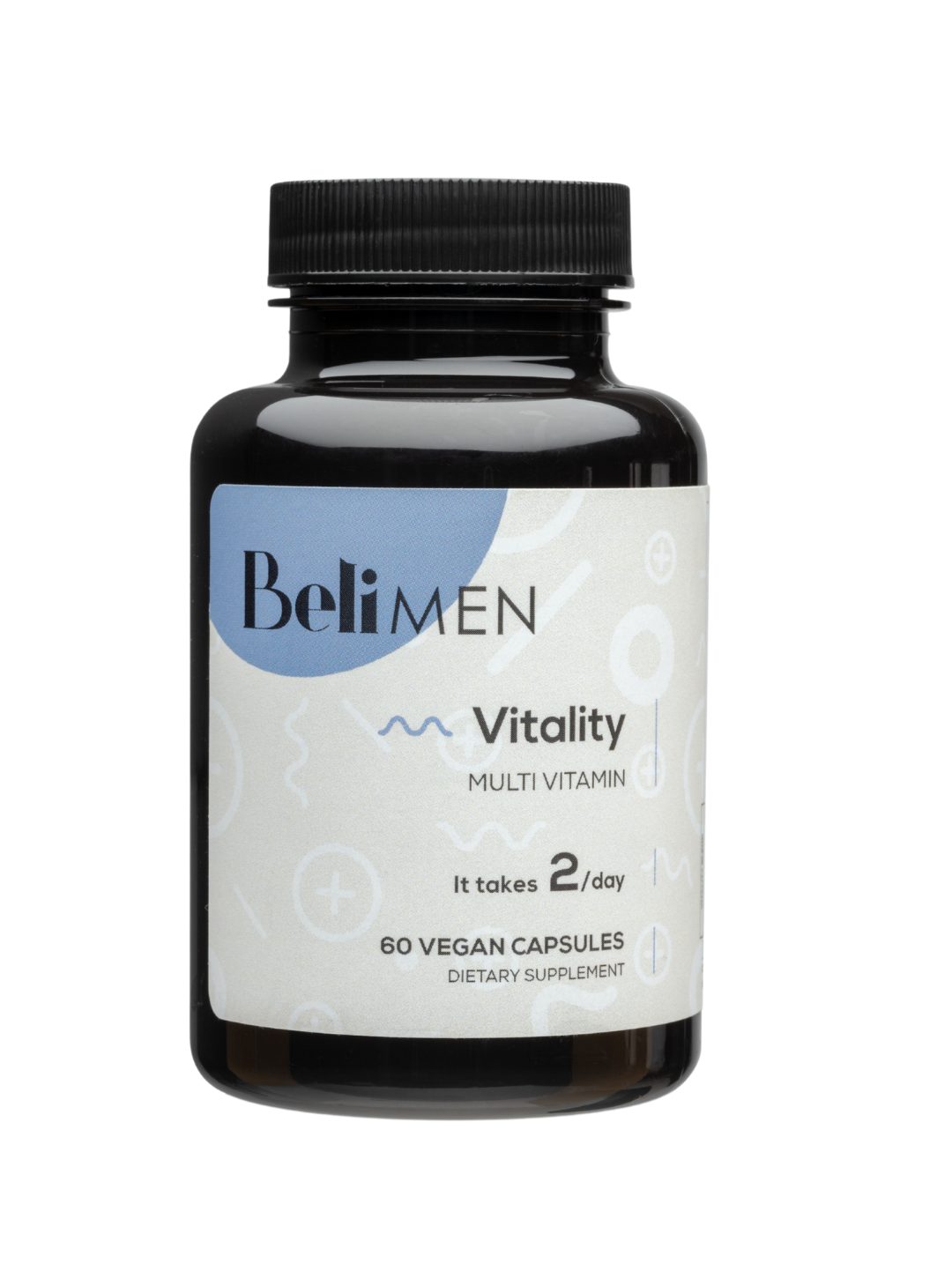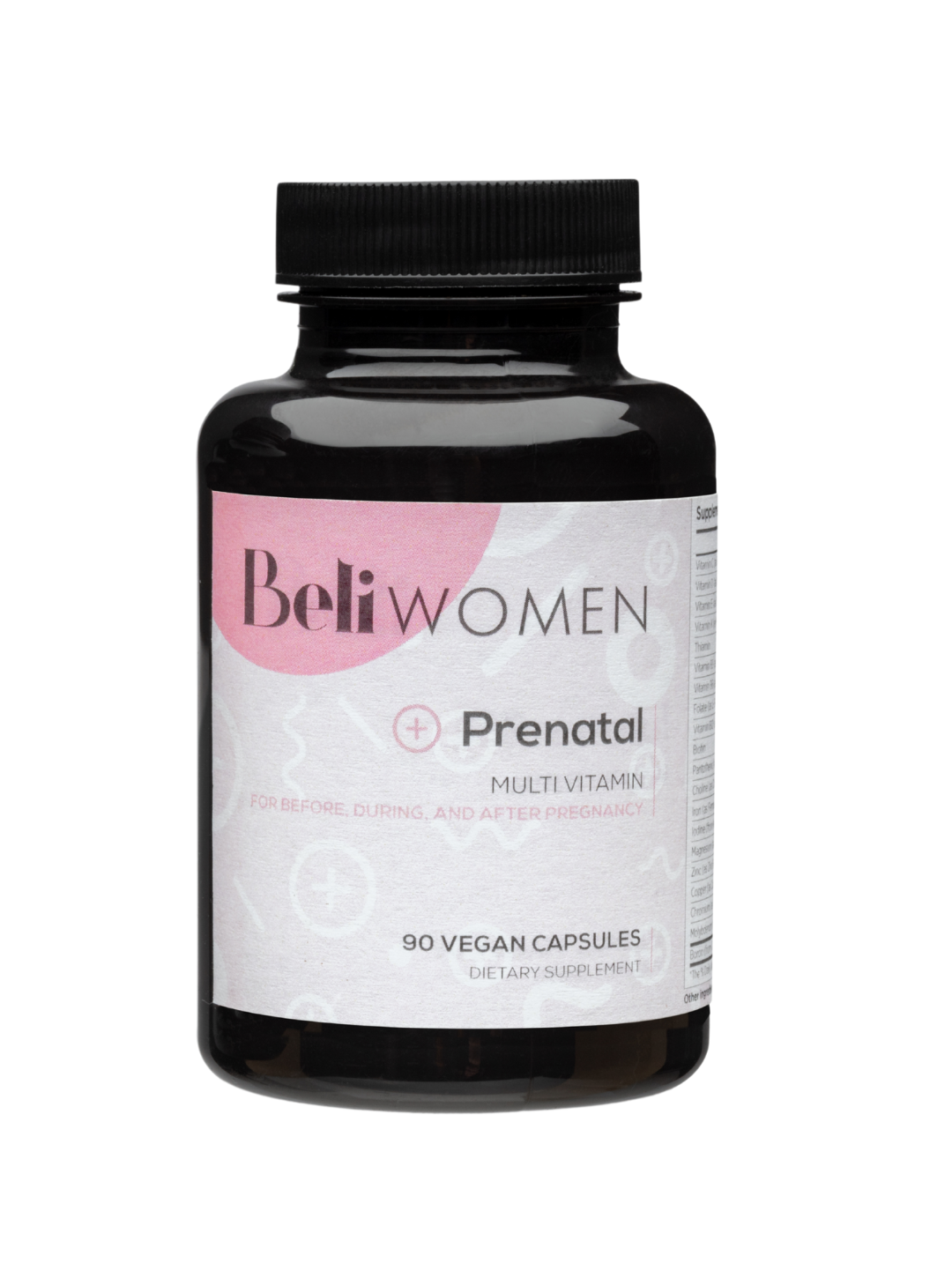Of all the science-backed ingredients you’ll find in Beli Vitality for Men, one really stands out for its clinical efficacy on male fertility, centuries-long history, and range of benefits. Now, shilajit is finally getting the credit it’s due, and we’re proud to point out that our proprietary formula was the very first to include this powerful Ayurvedic compound. Here’s why shilajit is rapidly becoming the darling of the male fertility world—and what you’re missing if you’re skipping it.
KEY TAKEAWAYS
- Shilajit is an Ayurvedic compound shown to support male fertility by increasing testosterone and promoting sperm health.
- Other benefits of shilajit include increased endurance, recovery, and muscle strength.
- Beli Vitality for Men is the first men’s prenatal vitamin to include shilajit.
What is Shilajit?
For centuries, shilajit (which is common in Ayurvedic medicine) has been consumed to improve stamina, longevity, and virility. But… what is it, exactly? Good question! This naturally-occurring substance is formed as humus and plants decompose. It’s a blackish-brown rock substance most commonly found high in the Himalayas between India and Nepal, though it also pops up in Tibet, Afghanistan, Russia, and the Andes.
Health Benefits of Shilajit
In the 20th century, shilajit was widely used by Russian Olympic athletes and elite military forces because of its effects on muscle strength, endurance, and recovery. But there are other health benefits to this truly impressive resin:
- Rich in antioxidants. The abundance of fulvic acid that naturally occurs in shilajit means it's a strong antioxidant and anti-inflammatory, so it may help protect against cellular damage and free radicals. There's some evidence (1) suggesting shilajit could improve longevity and slow the aging process. The same study suggests that that the molecular composition of shilajit may also prevent the accumulation of tau protein, which contributes to brain cell damage. That means shilajit could slow or even prevent the progression of Alzheimer's.
- Increases testesterone. Men experiencing symptoms of low testosterone, including low sex drive, hair loss, fatigue, loss of muscle mass, and increased body fat may find that shilajit supplementation helps. One study (2) showed that participants had a significant boost in testosterone after 90 days of supplementation.
- Helps reduce stress and anxiety. High levels of potassium and magnesium have a relaxing effect on tight muscles, which can help lower physical stress. Plus, shilajit boosts dopamine production, which has a body-wide calming effect.
- Supports heart health. Regular shilajit consumption can boost glutathione levels in the body, an antioxidant that supports a healthy heart.
Shilajit for Male Fertility
American neuroscientist and tenured Stanford professor Andrew D. Huberman is the latest to discuss shilajit’s fertility benefits on a recent episode of his Huberman Lab Podcast. “The other supplement that's been shown to improve both egg quality and sperm quality, and there I'm referring to a number of different parameters related to egg quality and sperm quality, as well as to increase libido fairly substantially, is a substance called shilajit.”
He explains that “there's some really good research studies exploring the supplementation with shilajit at about 250 milligrams twice per day. And this has been looked at in males and in females. It does seem to significantly increase two hormones. One is testosterone, and the other is follicle stimulating hormone. And for that reason, shilajit is often considered a tonic that people use both as an aphrodisiac to increase libido, as well as to increase fertility.”
Huberman is likely referring to the 2016 study featuring healthy male volunteers between 45 and 55. After twice daily doses of 250 mg apiece throughout the 90-day study, participants showed significantly increased testosterone. It’s a finding that supports an earlier study (3) of 60 infertile men taking shilajit twice a day for 90 days found an increase in total sperm count for over 60% of participants, while over 12% also saw an improvement in sperm motility.
Because shilajit can also relieve symptoms of stress and anxiety, it may also have a positive effect on sexual arousal and virility. Other reported side effects include increased energy and a greater overall sense of well-being, not to mention an improvement in certain cognitive disorders.
How Do You Take Shilajit?
These days, shilajit is commonly found in liquid or powdered form, though it can be found in its original resin form. While direction for use will vary, these forms can generally be added to drinks like teas and smoothies. Often, shilajit is consumed with a glass of milk. Of course, the easiest option is capsule form, which brings us to...
The Beli Vitality Blend
Shilajit is one of fourteen ingredients in Beli Vitality for Men, and it’s also one of the six that get credit for the name. In addition to 250mg of shilajit per serving—included for all the benefits we’ve outlined above—our formula includes:

- L-Carnitine, associated with higher fertilization rates (4) and improves sperm motility. We include 100mg per serving.
- L-Arginine, key for healthy sperm production and can also improve sperm motility (5). We include 200mg per serving.
- Coenzyme Q10, or CoQ10, a doctor-approved antioxidant shown to support sperm motility (6) and improve fertilization rates (7) after just a few weeks. Our blend has 100mg per serving.
- L-Taurine, an important role in sperm motility and morphology (8). We include 110mg per serving.
- N-Acetyl-L-Cysteine, or NAC, supports multiple sperm parameters (9), including count, motility, and morphology. Our blend has 25mg per serving.
We pair this Vitality blend with vitamins C, D3, E, B6, B12, methylated folate, zinc, and selenium, all of which offer their own benefits to male fertility. It’s a formula based on the most current research in men’s fertility nutrition, and we don’t stop there. We use the highest quality, most bioavailable forms of these nutrients for the greatest efficacy, and our prenatal vitamins are manufactured in cGMP and FDA-registered facilities. Plus, they've earned the Purity Award from the Clean Label Project.
The Bottom Line
Specific nutrients have been proven to support male fertility and sperm health, and shilajit is one of them. You won’t find it in the average prenatal vitamin, but the buzz is growing about the benefits of this ancient Ayurvedic compound, especially for male fertility. It’s a hero ingredient in our proprietary men’s prenatal vitamin formula, and it’s not the only one!
Resources
1. Carrasco-Gallardo C. et al. (2012). Shilajit: A Natural Phytocomplex with Potential Procognitive Activity. https://www.ncbi.nlm.nih.gov/pmc/articles/PMC3296184/
2. Pandit S et al. (2015). Clinical evaluation of purified Shilajit on testosterone levels in healthy volunteers. https://pubmed.ncbi.nlm.nih.gov/26395129/
3. Biswas T.K. et al. (2010). Clinical evaluation of spermatogenic activity of processed Shilajit in oligospermia. https://pubmed.ncbi.nlm.nih.gov/20078516/
4. Wu Z et al. (2012). Short-term medication of L-carnitine before intracytoplasmic sperm injection for infertile men with oligoasthenozoospermia. https://pubmed.ncbi.nlm.nih.gov/22474993/
5. Scibona M et al. (1994). L-arginine and male infertility. https://europepmc.org/article/med/7701414
6. Lewin A et al. (1997). The effect of coenzyme Q10 on sperm motility and function. https://pubmed.ncbi.nlm.nih.gov/9266524/
7. Vishvkarma R et al. (2020). Coenzyme Q10 effect on semen parameters: Profound or meagre? https://onlinelibrary.wiley.com/doi/abs/10.1111/and.13570
8. Yang J et al. (2010). Effects of taurine on male reproduction in rats of different ages. https://www.ncbi.nlm.nih.gov/pmc/articles/PMC2994374/
9. Jannatifar R et al. (2019). Effects of N-acetyl-cysteine supplementation on sperm quality, chromatin integrity and level of oxidative stress in infertile men. https://www.ncbi.nlm.nih.gov/pmc/articles/PMC6377938/





